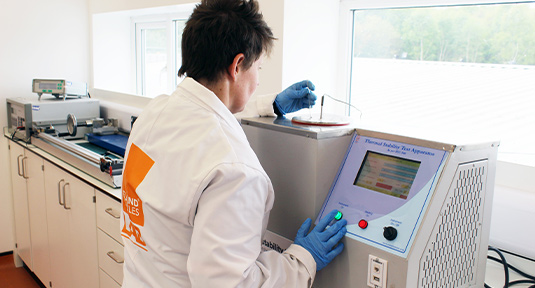Thermal Stability Testing for Cables
All the tests are carried out not less than 16 hours after the extrusion of the insulating or sheathing compounds. and are conducted in accordance with the international standard IEC 60811-1-2. Test methodology requires glass test tubes 110 mm long, with an outer diameter of approximately 5 mm and an inner diameter of (4,0 ± 0,5) mm, universal indicating paper (pH range of 1 to 10), and a thermostatically controlled heating apparatus for the temperature specified in the standard of the cable type being tested. The temperature is controlled by heating a solid aluminium block with a digital temperature controller to maintain constant uniform heat throughout the testing.
Three samples, each of (50 ± 5) mg, are be taken from the sheath or the core insulation to be tested. Each sample consists of two or three small strips of between 20-30mm. These samples are placed into a glass tube along with a strip of dry universal indicating paper measuring about 15mm long by 3mm wide. The pH paper must protrude out of the top of the tube by about 5mm. The test samples then placed in the thermal heating equipment (already at the specified temperature) and heated for the specified time.
Thermal stability testing measures either the time it takes for the universal indicating paper to change colour from a pH value of 5pH to a value between 2- 3pH, or for a specified duration without pH colour change, whichever is soonest. The colour change point is considered to have been reached when the red colouring of the universal indicating paper characteristic of a 3pH value has just become visible. Towards the end of the expected test time, the pH paper is replaced every 5 min to 10 min so that the moment of change is better visible.
For a cable to meet the requirements of Thermal Stability Testing, the average value of the three samples shall not be lower than the value specified in the standard for that type of cable.
Cable Sizing Calculator
Supporting Low Voltage cable sizing to BS and IEC standards with our easy-to-use calculator
Try it now
Custom Cable Design
Tailoring cables to meet bespoke requirements of performance or environmental challenges when off-the-shelf options are unavailable.
Read moreCPD Cable Training
Expert cable tuition from our experts with CPD-certified cable training and tailored cable learning programmes
Courses